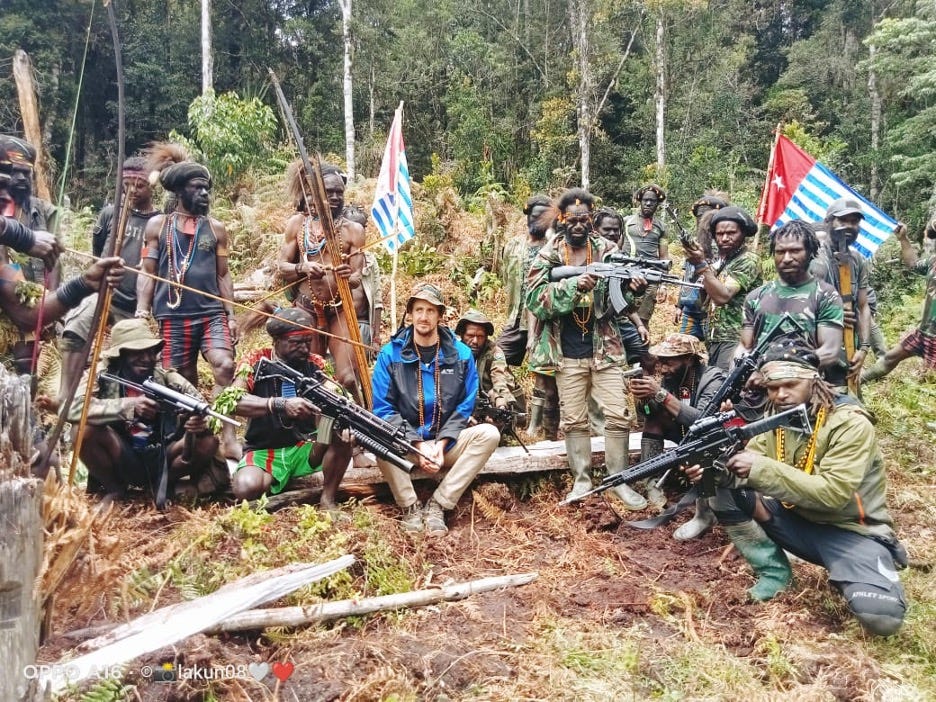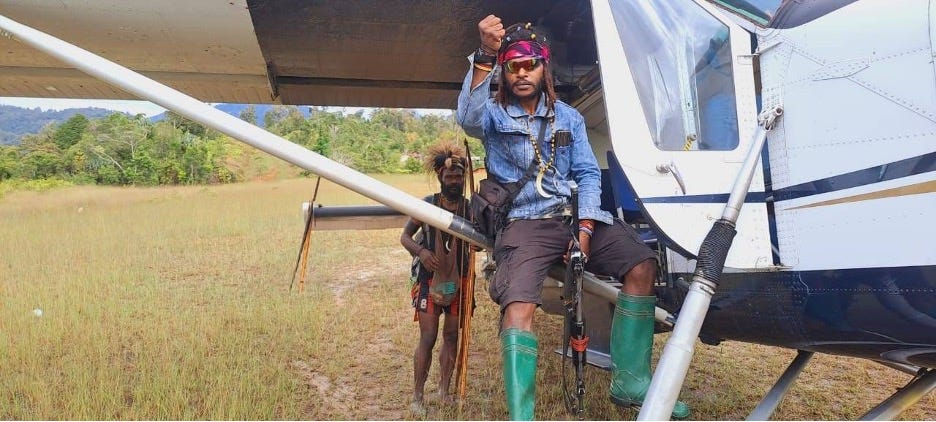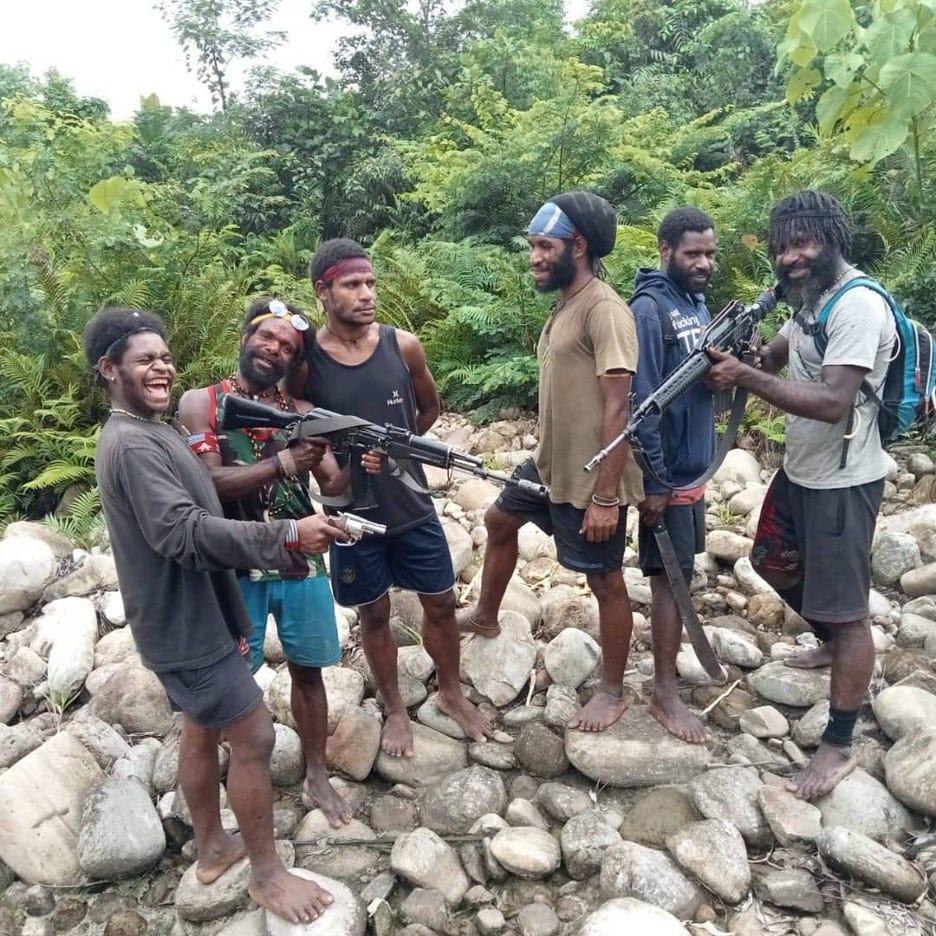West Papua: The Insurgency that Indonesia Can No Longer Hide
As much as Jakarta would like to downplay the growing insurgency in West Papua, systemic challenges are likely to make this impossible moving forward.
TPNPB fighters with captive Philip Mehrtens. Sourced from TPNBP releases.
On February 7, New Zealand citizen Philip Mehrtens marked one year in captivity in one of Indonesia’s most remote regions. Mehrtens is being held by the West Papua National Liberation Army (TPNPB), an insurgent group fighting for independence against the Indonesian government. This is currently the longest-running hostage situation in the group’s history and although the TPNPN claimed it would release Mehrtens earlier this month, it has given no definitive timeline. Now in its 62nd year with an estimated 500,000 Papuans killed since it began, the insurgency in West Papua has been steadily gaining momentum in recent years. With Indonesians heading to the polls to elect a new president today, their decision as to who inherits this escalating conflict is unlikely to produce a meaningful change in policy, regardless of outcome. For this reason, the worsening security situation in West Papua is likely to become a growing challenge for Jakarta at home and on the world stage moving forward.
West Papua, Indonesia. Source
A Stronger and More Volatile TPNPB
“Gone are the days that Papuan rebels would save precious bullets. Now they can shoot for days.”
- Deka Anwar, quoted in Reuters
What began as a loose collection of Papuan insurgents equipped with little more than bows, arrows, and spears has evolved into a significant threat Indonesia’s massive security apparatus. The TPNPB is now capable of conducting large-scale ambushes, attacking civilian and infrastructure targets and disrupting construction projects. This has in part been achieved by increasingly sophisticated financing.
Last year, Indonesian police claimed that the TPNPB had been siphoning money from a US $337 million village development fund allocated by Jakarta to the Papuan provinces. Although it is unclear how much of this reached TPNPB coffers, the investigation found that the group had infiltrated sympathetic officials who had access to the fund. The TPNPB also levies “revolutionary taxes” by extorting locals and gains profits from artisanal gold panning and other resource extraction in the Papuan Highlands.
The increased cashflow that resulted from these activities has helped the TPNPB acquire various types of small arms ranging from WWII-era guns to state-issued rifles and foreign arms. These are frequently smuggled across the porous border with neighboring Papua New Guinea: the United Nations Office for Disarmament Affairs claims that Papua New Guinea was home to over 50,000 illegal firearms in 2021 including homemade firearms, Australian-made SLRs, US-made M16s, AR15s, and other weapons. Many of the weapons acquired by the TPNPB came from the Indonesian government, being either taken in TPNBP raids or sold to them by corrupt local politicians and security officials. This corruption has been reportedly happening for years: “buying weapons from members of the military and police is natural; they need money and we need weapons … And (some of them) feel the suffering of the Papuan people,” said TPNPB spokesman Sebby Sambom said in a December 6 interview.
In addition to its growing firepower, the TPNPB has become increasingly volatile in recent years. This includes possible divisions among the various factions under the TPNPB umbrella: for example, the kidnapping of Philip Mehrtens was ordered by a young and notorious commander named Egianus Kogoya and without official sanction by TPNPB central leadership. In his December 6 interview, Sebby Sambom stated central leadership had unsuccessfully lobbied for the release of Mehrtens last year. Last year also saw violent confrontations between TPNPB factions with at least three clashes occurring between April and July. These examples indicate a growing disconnect between TPNBP leadership and its armed factions.
TPNBP Commander Egianus Kogoya has been holding a foreign hostage for over a year now, a direct challenge to the organization’s leadership. Sourced from TPNBP releases.
The insurgency Indonesia doesn’t want you to know about
The TPNPB has been conducting increasingly noteworthy attacks: these include the 2018 Nduga massacre that killed 20 people and the assassination, the local head of Indonesia’s State Intelligence Agency, and multiple attacks on mining sites. Incidents such as these and the ongoing Mehrtens abduction case have gained growing international attention and put considerable pressure on Jakarta. This is highly inconvenient for an Indonesian government that has long sought to downplay the conflict in an attempt to reassure foreign governments and businesses who have invested heavily in the resource-rich region, which includes substantial reserves of copper, nickel, oil, and gas, as well as the world’s largest gold mine. There are even allegations that the Indonesian government used bots to push pro-government messages across various social media platforms during the breakout of mass pro-Papuan independence and independence protests in 2019.
Although authorities reportedly a cracked down on official corruption in West Papua last year, it remains a significant challenge. Corruption, especially among Indonesia’s armed forces, remains a major systemic barrier to progress and an embarrassment to Jakarta on the world stage. Indonesia scored 34/100 in the Corruption Perceptions Index in 2023, ranking 115th out of the 180 surveyed countries. Members of Indonesia’s security establishment, including high-ranking personnel, have been found to be involved in illicit mining, narcotics, murder, and other criminal cases across the country. In Papua, this has even resulted in the deaths of foreign nationals allegedly caught up in clashes between local police and security personnel over lucrative security contracts. This corruption has permitted security forces to commit widespread abuses in the region – including extrajudicial killings – with near total impunity: such cases not only lead to a deteriorating security situation, but are also a boon for recruitment efforts by the insurgents. Without addressing the issue of systemic corruption both locally and among the armed forces, it is difficult to foresee a meaningful solution to the security situation in West Papua.
TPNPB fighters in the highlands. Sourced from TPNBP releases.
West Papua and Indonesia’s 2024 presidential election
Outgoing Indonesian President Joko Widodo (Jakowi) has attempted to resolve the decades-long insurgency in West Papua by encouraging regional economic development. During his time in office, Widodo claims to have constructed 3,462 km of roads under the Trans-Papua Highway Project. However, such efforts have not halted the insurgency, which has flared to unprecedented levels during his ten-year-long tenure. This is largely because these attempts at regional development have failed to address the various contemporary and historical grievances of the Papuan people. For example, the 2022 division of West Papua’s two former provinces into has been broadly perceived by locals as a means for Jakarta to exert greater administrative control over the region. This combined with regular reports of severe human rights violations by security forces underline the fact that Jakarta’s approach in West Papua has changed little over the decades, relying on forceful subjugation rather than meaningful co-option. This approach has failed.
Despite this apparent failure, the new administration to come out of the 2024 election is unlikely to oversee a meaningful shift in policy. Current presidential frontrunner, Prabowo Subianto has a very checkered past. The former son-in-law of former President Suharto, Prabowo was dismissed from the military in 1998 for his role in the abduction of pro-democracy protesters. He has also been accused of war crimes in Timor-Leste and human rights violations in West Papua. Should he win the election as expected, there is a high possibility that the situation in West Papua could continue to deteriorate as force, even of the extreme variety, has done little to dissuade the TPNPB to date. Meanwhile another popular candidate and daughter of Indonesia’s first president Sukarno, Megawati Sukarnoputri made headlines in 2022 for suggesting she prefers Papuans who are of mixed Indonesian-Papuan ancestry and thus like “milk coffee” and “not black” – a statement some have claimed carries genocidal undertones. Indonesia has a long history of racism towards Papua, another systemic barrier to peace and prosperity in the region.
TPNPB fighters. Sourced from TPNBP releases.
Conclusion
Indonesia’s decades-long approach to West Papua has had a deleterious impact on security in the region. Although Jakarta has attempted to soothe the concerns of foreign governments and investors by downplaying the conflict its growing intensity will likely make this an increasingly impossible course of action. On the eve of a new presidency, any sort of meaningful shift in policy toward the region is highly unlikely and with Jakarta facing a stronger and increasingly volatile insurgency, this conflict is likely to make further international headlines in the coming months and years.








